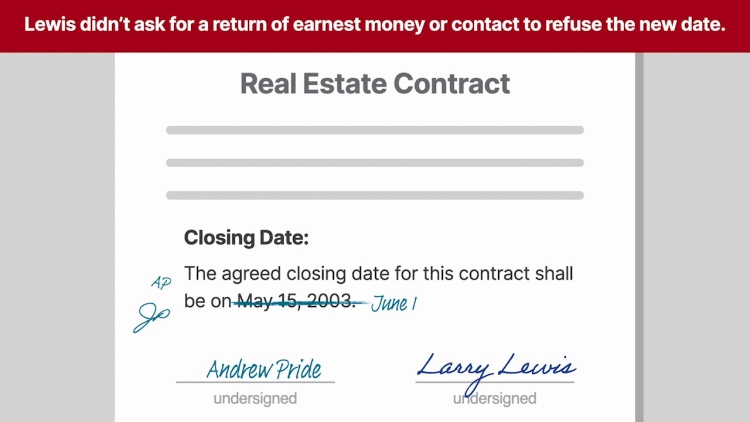Pride v. Lewis
Missouri Court of Appeals
179 S.W.3d 375 (2005)

- Written by Josh Lee, JD
Facts
Andrew and Joyce Pride (plaintiffs) placed a house on the real-estate market. Larry Lewis (defendant) made an offer to purchase the house for $55,000, with financing to be provided by the Prides. This offer was rejected by the Prides. Lewis made a second offer for the same purchase price but used traditional bank financing. The second offer was in the form of an executed contract and stated that the closing date would be May 15, 2003. Lewis deposited earnest money of $1,500 in conjunction with the offer. The Prides executed the contract as well but changed the closing date, by hand, to June 1, 2003. The Prides initialed this change, but Lewis did not initial the change. Lewis did not communicate further with the Prides, did not request a refund of the earnest money, and did not close on the house. The Prides placed the house back on the market and sold the house approximately one year later for $40,000. The Prides had terminated a lease for the house prior to the scheduled closing date with Lewis and were unable to obtain another tenant while the house was again on the market. The Prides sued Lewis for breach of contract and sought damages of the difference between the sales prices and the lost rent from terminating the lease arrangement. The trial court found in favor of the Prides and awarded $20,900. Lewis appealed to the Missouri Court of Appeals.
Rule of Law
Issue
Holding and Reasoning (Ulrich, J.)
What to do next…
Here's why 911,000 law students have relied on our case briefs:
- Written by law professors and practitioners, not other law students. 47,100 briefs, keyed to 997 casebooks. Top-notch customer support.
- The right amount of information, includes the facts, issues, rule of law, holding and reasoning, and any concurrences and dissents.
- Access in your classes, works on your mobile and tablet. Massive library of related video lessons and high quality multiple-choice questions.
- Easy to use, uniform format for every case brief. Written in plain English, not in legalese. Our briefs summarize and simplify; they don’t just repeat the court’s language.





